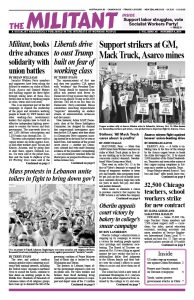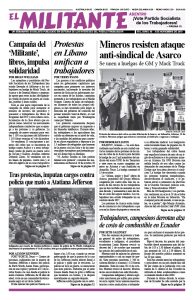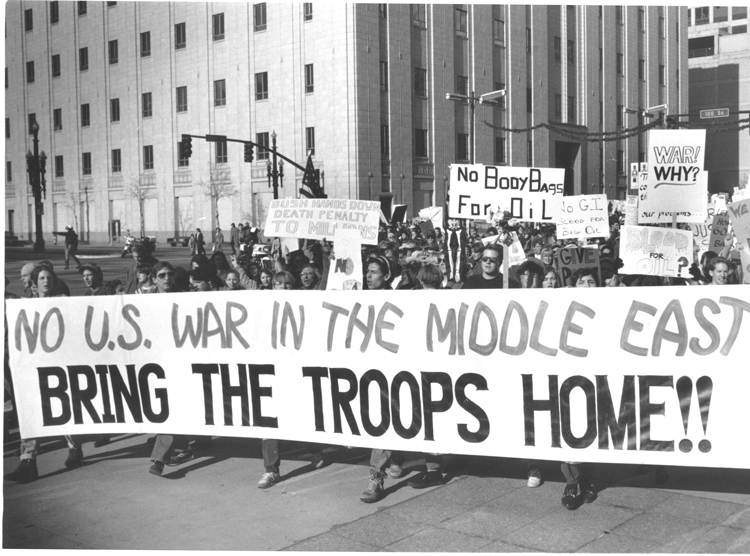The Spanish edition of U.S. Hands off the Mideast! Cuba Speaks Out at the United Nations by Fidel Castro and Ricardo Alarcón, is one of Pathfinder’s Books of the Month for November. This excerpt is from a 1990 speech by Fidel Castro to a ceremony celebrating the 30th anniversary of Cuba’s Committees for the Defense of the Revolution. It’s titled, “We Had the Honor to Vote ‘No.’” In 1990, as U.S. imperialism was preparing for a massive invasion of Iraq, the permanent members of United Nations Security Council — Britain, China, France, the USSR and the U.S. — voted to back the bloody slaughter. Cuba, serving a two-year term on the Security Council, was the only country to vote against. “End the philosophy of plunder and the philosophy of war will be ended as well,” Castro had told the U.N. General Assembly 30 years earlier. Copyright ©1990 by Pathfinder Press. Reprinted by permission.
In recent days we have been more than a little concerned about the fate of dozens and dozens of Third World countries. You will have noted the conduct of our representative on the United Nations Security Council around the crisis in the Arab-Persian Gulf. We have the privilege of being able to act there in a completely selfless manner, in a completely dignified manner, and with a spirit of complete fairness. We have made extraordinary efforts to achieve peace. We have sought to find a solution to the problem without war, a solution that is just.
We did not hesitate to reject and condemn the occupation and annexation of Kuwait. We did so as a matter of principle and on the basis of norms of international law that we believe should hold sway in our world. We therefore did not hesitate to support resolutions condemning those actions that, in our judgment, violated international law.
But at the same time, we have energetically opposed everything we consider unjust. And one of the most unjust things is the attempt to force an entire people to surrender through hunger. This is what the embargo amounts to.
We first of all energetically fought to exclude food and medicine from the embargo. For if one can condemn the practice of taking hostages and turning innocent persons into hostages — a practice we oppose and will always oppose — it is even more cruel to try to starve to death millions of women, elderly people, and children to attain a given objective. And this embargo does not affect the military forces primarily. Rather it causes suffering to the civilian population, and among them to millions of women, elderly people, and children.
This is a detestable practice. Yet this is what the United States has sought to do and has done, in opposition to Cuba’s efforts to clearly define the embargo and to exclude from it food and medicine. …
But then something occurred that was truly shameful: the Security Council passed a resolution giving its blessing to the unilateral blockade by the United States, a resolution we opposed. I believe that was a shameful day, a dishonorable day for the Security Council — the day that body gave its blessing to unilateral military action by the United States. At that moment it became clear that the United States was running the show in the Security Council.
Now they have approved an air embargo. Cuba voted against it, the only country to do so! We had the honor and glory of being the only country to vote “No”! [Prolonged applause] History will record the honor, the dignity, and the courage with which Cuba acted during that moment of such importance to the life of humanity. It was necessary to take a firm position and we did not abstain — we voted “No”! And we will vote against everything we do not agree with, even if we are the only ones. [Applause] …
We believe there should be guarantees for all the countries of the region. And we believe that if the United Nations is able to achieve a political solution, it could also work out formulas to provide guarantees to all the countries of the region. This would include both the withdrawal of Iraqi troops to their border and their territory, and the withdrawal of U.S. and NATO troops from the Arab-Persian Gulf.
Failure to attain a political solution would be a defeat for humanity, and we have concentrated our efforts on achieving such a political solution. We have worked for this and continue to do so, although we are aware that less and less time remains.
We do this not only because it flows from the political principles of our people and our revolution, and not only to fulfill international obligations. We do this because it genuinely pains us very much to see a world catastrophe approaching, and not able to be halted. And here we are not dealing with a catastrophe of nuclear weapons, no — although no one knows what will happen there. No one can say for sure whether or not chemical weapons and nuclear weapons will be used.
But such a war will not only cost many lives on the battlefield there. Such a war would also be a catastrophe for the world economy, especially for the economies of the developing countries, of the non-oil-producing Third World countries, which are the vast majority. Just as some countries will be swimming in money, others will be swimming in misery, sacrifice, and suffering of every type. For every life lost on the battlefields of the Arab-Persian Gulf, a thousand persons will die of hunger in the Third World. Such a fate would be unavoidable.
The outbreak of a conflict in the Arab-Persian Gulf — the military solution — would entail the risk of becoming a chemical war, and perhaps a war involving the use of tactical nuclear weapons. In addition, there would be incalculable destruction not only of lives but of energy resources, which are becoming more and more each day the Achilles’ heel of the world economy and the economies of Third World countries. …
We will continue waging this honorable and at times solitary battle. We will not give up our principles, we will not vacillate, and we will not retreat!


